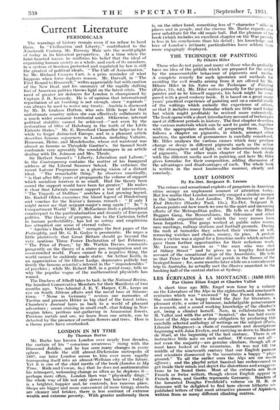Current Literature
PERIODICALS The warnings of history remain even if we refuse to heed them. In Civilization and Liberty," contributed to the Nineteenth Century, Mr. Ramsay Muir sets the world-plight of today in its historical perspective. At a time when the faint-hearted waver, he reaffirms his belief that the ideal of organizing human society as a whole, and each of its members, in a system of freedom protected and regulated by law is still the greatest of political ideals. "The Cult of Assassination," by Mr. Richard Comyns Carr, is a grim reminder of what happens when force replaces reason. Mr. Darvall, in "The First Round to Roosevelt," writes appreciably but with caution of the New Deal, and his summary of the rapidly shifting foci of American politics throws light on the latest crisis. The need of greater air defences for London is championed by Captain J. 11. Kennedy. He is of opinion that international repudiation of air bombing is not enough, since "reprisals" can always be used to waive any treaty. Austria is discussed by Mr. D. Graham Hutton, who sees little hope for that unfortunate country unless she can effectively collaborate in a much wider economic territorial unit. Otherwise, internal political stability cannot be achieved—" not even by the restoration of Otto of Habsburg in the teeth of the Little Entente States." Mr. E. Beresford Chancellor helps us for a while to forget distracted Europe, and in a pleasant article describes famous sojourners in London, including Voltaire, Rousseau, Heine, and Mendelssohn, whose red waistcoat was almost as famous as Theophile Gautier's. Sir Samuel Scott confounds very agreeably the scandal-mongers in an article dealing with Dr. Johnson and Mrs. Three. Sir Herbert Samuel's "Liberty, Liberalism and Labour," in the Contemporary contains the matter of his Inaugural address at the Liberal Summer School. He criticizes the recent Labour Programme as a glowing vision of a distant ideal. "The remarkable thing,' he observes caustically, is that after fifty years of propaganda the volume of support which socialism receives is so small. Had the theory been sound the support would have been far greater." He makes it clear that Liberals cannot support a war of intervention.
The Tragedy of Dollfuss " seotches a fast growing legend. Dr. Rudolf Olden examines the bland legend of Hindenburg and vouches for the Kaiser's famous remark : "If only I might never see that serjeant-major's mug again ! " In A Compartment World" Mr. F. McEachran finds a philosophical counterpart to the particularization and disunity of European politics. The theory of progress, due to the Cartesian, belief in human perfectibility, has led us astray and empiricism has atrophied our sense of eternal values.
"Austria's Dark Outlook" occupies the first pages of the Fortnightly, and Mr. G. R. Gedye is pessimistic. He urges a little plaintively that Great Britain should go beyond the very cautious Three Power - Declaration of last February. "The Price of Peace," by Mr. Watkin Davies, comments pungently on the theory of a status quo, immigration and an overerawded world. Peace cannot be a negative thing, the world cannot be suddenly made static. Sir Arthur Keith, in an appreciation of Sir Oliver Lodge, deprecates politely but firmly the famous scientist's interest in the " imponderables" of psyehics ; while Mr. Robert Bell, in a genial essay, tells us why the popular vogue of the mathematical physicists has waned.
The Duchess of Athal takes to task, in the National Review, the hundred Conservative Members for their Manifesto of two months ago. Vice-Admiral J. E. T. Harper, C.B., keeps an eye on South African affairs and the naval base at Simons- town. - "Noise in Germany" revives our memories of Tacitus and presents Hitler as big chief of the forest tribes. Chambers's Journal lures us back to a world of pleasant adventure ; ocean cruising in small craft, char fishing in Nor- wegian lakes, perilous nut-gathering in Amazonian forests. Precious metals and ore, we learn from one article, can be detected by thepresence of certain flowers and trees. Here is a theme poets have overlooked.






































 Previous page
Previous page